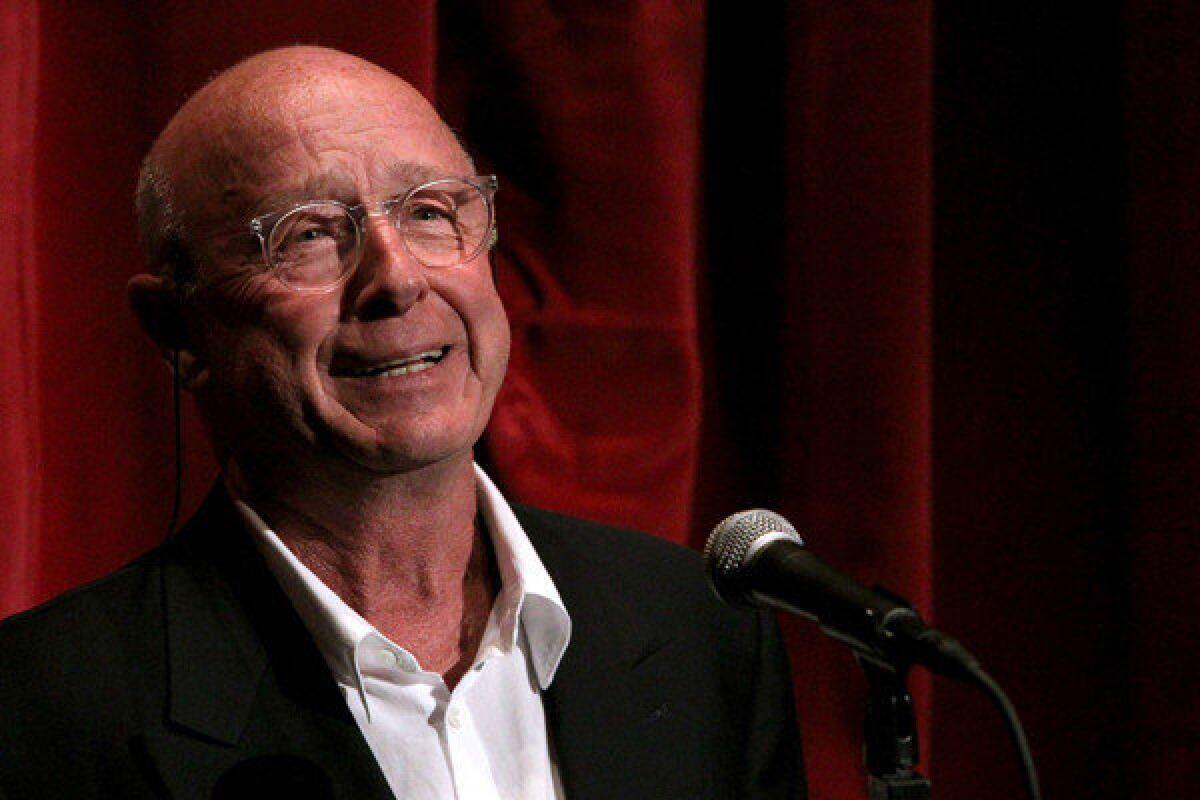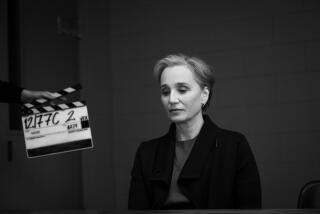Tony Scott death: Hollywood looks to his films to make sense of tragedy

- Share via
With films like “Top Gun” and “Man on Fire,” Tony Scott made spectacle movies about men who live by a code and face death on their own terms -- spies and crime lords, race car drivers and fighter pilots. Recently, the director-producer had struggled with what several associates described as a serious illness, and on Monday, friends and colleagues looked to his cinematic philosophy to make sense of his fatal plunge off Vincent Thomas Bridge in San Pedro.
“I put myself in that car seat and in his place and think about what he must have been experiencing and it must been such an unbreachable level of pain,” said Joe Carnahan, who directed the 2010 movie “The A-Team,” which Scott produced.
“I don’t want to understand it because it is so powerfully sad,” added Carnahan, who said he considered Scott a mentor. “If there was indeed something terminally ill about Tony, this is the way he would go out: big and facing death, without shrinking away from it. He wouldn’t wait for death. The idea of death encroaching, coming for him? No, Tony would be the first one to ride out and find the death, he wouldn’t wait to waste away. He would have gone right into the heart of it.”
PHOTOS: Tony Scott’s action-packed filmography
Two people close to Scott said he was suffering from a serious physical ailment at the time of his apparent suicide. The two, who asked not to be identified because of the personal nature of their relationships, said they did not know the nature of his illness. ABC News, quoting a source close to the director-producer, said that Scott had inoperable brain cancer.
Los Angeles County Coroner’s officials said that an autopsy planned for Monday would look for signs of an underlying health problem.
Scott, 68, parked his car on the span Sunday afternoon, climbed out, and jumped, witnesses told police. The director appeared nervous before leaping to his death, a witness said.
PHOTOS: Celebrities react to Tony Scott’s death
“He was on the roadway close to the fence looking around. He was looking around and fumbling with something at his feet. He looked nervous,” witness David Silva said in an interview with The Times. “I thought it was some extreme-sports guy.” Silva said Scott “paused a couple of seconds and then began to climb the fence. He put his foot on the top of the fence and paused again. And then he threw himself off. I immediately thought, that guy is dead.”
Silva said that while Scott may have appeared hesitant on the bridge, he looked like he knew in advance what he planned to do. “He was very methodical,” Silva said.
The director-producer was an experienced rock climber who planned to scale Yosemite’s El Capitan, said one person who worked closely with Scott.
PHOTOS: Director Tony Scott dead at 68
Scott left a suicide note in his West Hollywood offices, law enforcement sources said. Its contents have not been revealed publicly, police said.
In addition to being one of Hollywood’s top action moviemakers—his films, including “Beverly Hills Cop II,” “Unstoppable” and “Crimson Tide” have grossed more than $1 billion in domestic ticket sales combined—Scott was a successful commercial director and television producer. He was considering directing four other movies at the time of his death, including a sequel to “Top Gun.”
Scott, the younger brother and business partner of “Gladiator” filmmaker Ridley Scott, was one of the first directors to make the transition from commercials to features, a path followed by directors Michael Bay (“Transformers”) and David Fincher (“Fight Club”).
Scott followed his first film, the 1983 vampire tale “The Hunger,” with 1986’s “Top Gun,” a profile of Navy fighter pilots that cemented Tom Cruise as one of the industry’s biggest movie stars.
The original “Top Gun,” which grossed a then-spectacular $354 million worldwide, immediately transformed Scott from a respected British commercial director into a Hollywood A-lister.
The next year, Scott directed Eddie Murphy in “Beverly Hills Cop II” and then went on to make big-budget thrillers including “Days of Thunder,” “Crimson Tide,” “Enemy of the State” and “Man on Fire” along with edgier fare such as “True Romance” and “Domino.”
Unlike many action directors, who often see their actors as interchangeable parts, Scott worked repeatedly with some of Hollywood’s most acclaimed performers, including Denzel Washington. Scott was “the kindest film director I ever worked for,” actor Val Kilmer, who was in Scott’s “Top Gun” and “True Romance,” said via Twitter on Monday.
In an industry that considers most people older than 50 past their prime, Scott was inundated with work assignments at the time of his death.
“He seemed like he always seemed—supportive and funny, but at the same time serious about the work,” said composer Harry Gregson-Williams, whose last film with Scott was 2010’s “Unstoppable” and who last spoke with the director three months ago. “Tony was always juggling lots of projects.”
“Tony was always an adventurer,” he said. “He was fiercely loyal. And he was very sensitive. Looking at his films, you might not think that. But he was an incredibly sweet, sensitive man.”
Among the many projects Scott had been working on in recent years was a remake of his first film, “The Hunger,” a 1983 vampire movie starring Catherin Deneuve, David Bowie and Susan Sarandon that had attracted a cult following over the years.
“He wanted to update it and modernize it,” said Whitley Strieber, who wrote the 1981 book upon which “The Hunger” was based. “He was eager to do it again and I wish he’d had a chance. Authors and filmmakers don’t always agree, but I sat in that movie and I thought to myself, ‘He has made his vision so beautifully.’”
Strieber said Warner Bros., which owns the rights to “The Hunger,” had passed on remaking the project a little over a year ago, and that he and Scott had not spoken recently.
“I was so grateful for what he did with my book,” Strieber said, “And I feel really sad about his passing. I know a lot of people who might do the same thing if they were facing a terrible diagnosis.”
Scott’s most recent television commercial was for Diet Mountain Dew, and was released this month. It featured Dallas Mavericks owner Mark Cuban trying to tempt a Diet Dew fan with riches, including a speedboat and a helicopter, if he would just give him the last bottle of the soda at a mini mart. Scott also directed commercials for BMW, Dodge, Italia Telecom, Marlboro, the U.S. Army and Barclays Bank.
“I feel blessed to have known and worked with Tony,” said cinematographer Paul Cameron, who shot Scott’s “Man on Fire” and “Deja Vu.” “He was way beyond a mentor to me. He was by far the most gracious, talented and hard-working man I have ever met.”
People who worked with or admired Scott took to Twitter to offer their memories of the filmmaker.
Robert Rodriguez, the director of “Sin City,” “Once Upon a Time in Mexico” and the “Spy Kids” franchise, said, “Great knowing you, buddy. Thanks for the inspiration, advice, encouragement, and the decades of great entertainment.” Ron Howard, the maker of “A Beautiful Mind,” said simply, “No more Tony Scott movies. Tragic day.”
Richard Winton and Julie Makinen contributed to this report.
ALSO:
Divers took hours to find Scott’s body
PHOTOS: Tony Scott behind the camera
More to Read
Only good movies
Get the Indie Focus newsletter, Mark Olsen's weekly guide to the world of cinema.
You may occasionally receive promotional content from the Los Angeles Times.












